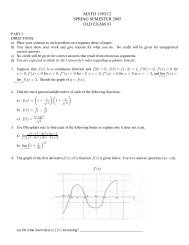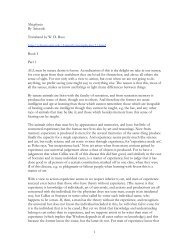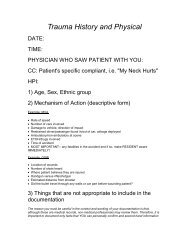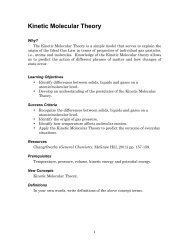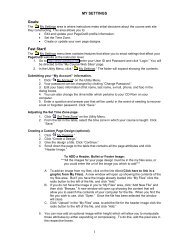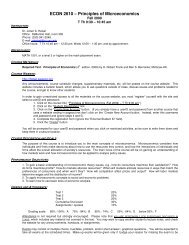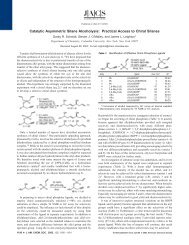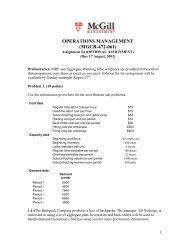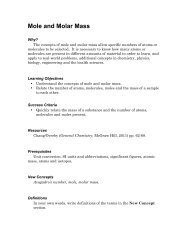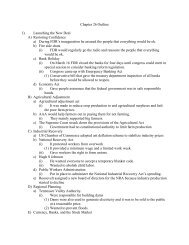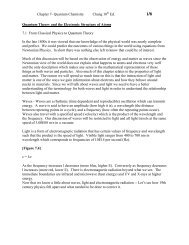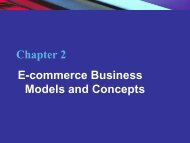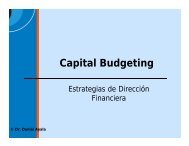ACC361E: PERFORMANCE MANAGEMENT - PageOut
ACC361E: PERFORMANCE MANAGEMENT - PageOut
ACC361E: PERFORMANCE MANAGEMENT - PageOut
You also want an ePaper? Increase the reach of your titles
YUMPU automatically turns print PDFs into web optimized ePapers that Google loves.
IESEG – SCHOOL OF <strong>MANAGEMENT</strong> (LILLE)<br />
<strong>ACC361E</strong>: <strong>PERFORMANCE</strong> <strong>MANAGEMENT</strong><br />
COURSE SYLLABUS – AUTUMN 2009<br />
Teachers:<br />
Timetable:<br />
Web Site:<br />
Ben Gibbs, email: b.gibbs@ieseg.fr<br />
Julien Margaine (Room A.325), email: j.margaine@ieseg.fr<br />
Anne-Catherine Moursli (Room A.327), email: ac.moursli@ieseg.fr<br />
About three interactive course hours every week (lecture + tutorial)<br />
In total, 39 contact hours + “Mission en Contrôle de Gestion” (~ 30 h).<br />
http://acmoursli.europe.pageout.net/. All information concerning the<br />
course will be published there: syllabus, schedule, additional material,<br />
PowerPoint slides, quizzes as well as text solutions. CHECK IT<br />
REGULARLY!!!<br />
I. COURSE OBJECTIVES<br />
The central objective of this course is to familiarize you with how cost management systems<br />
can be designed to measure and manage performance as well as to support managerial<br />
decision-making. The primary principle of cost management is that costs don't just happen -<br />
management decisions cause them. It is thus important to be aware of the cost and<br />
organizational effects of alternative management decisions. It is also essential to learn to<br />
interpret and identify opportunities and methods for improving costs and performance.<br />
This course is designed to help you develop an understanding of how cost accounting<br />
information can help an organization function more effectively, let you apply that knowledge<br />
through working on problems, and help you become discriminating producers and users of<br />
management accounting information.<br />
II. PREREQUISITES<br />
Students who sign up for this course should have basic knowledge of accounting<br />
principles. It is also imperative that they are willing to prepare and read the required<br />
material on their own before each session. The ability to participate, interact and ask<br />
critical questions is essential for success in this course<br />
III. REQUIRED MATERIALS<br />
• Cost Management: Strategies for Business Decisions, 4 ed., Ronald Hilton, Michael<br />
Maher, and Frank Selto, Irwin McGraw-Hill, 2008.<br />
This book has a web site with helpful information: http://highered.mcgrawhill.com/sites/0073526800/student_view0/index.html.<br />
It contains additional resources,<br />
exercises, PowerPoint slides, self-test problems and multiple choice quizzes for each<br />
chapter.<br />
• Additional supplementary material (e.g. cases, videos, reading) will be provided, in<br />
addition to the textbook material. You will be responsible for this reading.<br />
• A simple calculator that cannot store formulas. All others will be confiscated during tests.<br />
1
IV. CLASS DEVELOPMENT AND MODE OF INSTRUCTION<br />
This course will rely heavily on problem solving as the main pedagogical tool.<br />
A typical class will cover one or two chapters and will involve discussing the new<br />
concepts/techniques and solving the “suggested” end-of-chapters review questions or critical<br />
analysis as well as end-of-chapters exercises. You are expected to attempt the remaining<br />
suggested exercises after attending the class. It is your responsibility to go over the solutions<br />
to problems, ask questions and get your doubts clarified on an on-going basis with your<br />
teacher. To encourage participation, you will be asked to answer specific questions during the<br />
discussion. You are therefore expected to have read ALL material and do homework assigned<br />
for the day before attending the class (see VII. Class schedule).<br />
V. COURSE POLICIES<br />
Attendance is very important with this material and will be taken into account for the<br />
student's final grade. If you do not want to be penalized contact us beforehand<br />
regarding any work or emergency situations that will prevent you from attending<br />
class.<br />
Students are expected to arrive for class on time. Professors reserve right to refuse<br />
entry to students who arrive late.<br />
As preparation for each lecture students are expected to have read the assigned<br />
chapters and completed homework assignments prior to class work. Students will be<br />
expected to be able to present homework assignments to the class on an ad hoc basis<br />
(this means you will be called upon). Students are expected to actively participate in<br />
class activities.<br />
Students are expected to bring the textbook and a calculator to EACH class. Students<br />
will turn off all cell phones and/or beepers prior to coming into class.<br />
VI. GRADE BREAKDOWN<br />
The grading system is as follows:<br />
Performance Management (54 hours) Points Credits<br />
1- Exams: 60 5,5<br />
- Midterm Exam (Part 1: Cost Accounting) 30 2,25<br />
- Final Exam (Part 2: Management Control Systems) 30 3,25<br />
2- Continuous assessment:<br />
- MCQ / exercises<br />
- Participation<br />
Total 100<br />
“Mission en Contrôle de Gestion” (~ 30 hours) 2,5<br />
30<br />
10<br />
40<br />
2
1. Exams (60 points)<br />
There are two exams: one covers “Cost Accounting” (Part 1) and the second one covers<br />
“Management Control Systems” (Part 2). Those two exams are not cumulative and they will<br />
be closed book. You may expect exams to cover ANY material presented in class, the text,<br />
homework assignments, quizzes, exercises/problems/cases, readings, videos,<br />
CrossKnowledge modules and class discussions. Exams may consist of exercises, problems,<br />
cases and/or short essay questions.<br />
2. Continuous assessment (40 points)<br />
* Multiple Choice Quizzes / exercises (30 points)<br />
For each of the two parts of the course, you will have three graded quizzes and/or exercises.<br />
You will not be told in advance when you will be assessed. Be prepared for a graded<br />
assignment, based on the prior reading, at any time. In case of absence, you will have zero.<br />
At the end of each part, we will get rid of the worst mark and keep the two best continuous<br />
assessment grades.<br />
* Participation (10 points)<br />
Participation will be based on homework assignments as well as active class attendance.<br />
Class attendance and participation are vital to the learning experience, as is being prepared for<br />
class. Your contribution in class will be based on active, quality and regular participation.<br />
We expect you to be at each lecture and tutorial having read the material or prepared the<br />
recommended exercises and ready to participate in the day's discussions and exercises. We<br />
encourage you to ask questions (NO question is a “bad” question), seek our help when you<br />
need it, and help your classmates understand the material. Your attitude is also of the utmost<br />
importance. Students who consistently display a constructive attitude to learning and a<br />
positive mindset will be rewarded in their participation grade.<br />
Please be in class on time. If you have to be away from class and you don’t want to be<br />
penalized for missing the class, notify us ahead of time, just as you would if this class was<br />
your job.<br />
VII. CLASS SCHEDULE<br />
Daily assignments will be announced in class. The following schedule is tentative and may be<br />
adjusted as the course progresses. Any changes to the schedule will be announced in class<br />
and/or on the <strong>PageOut</strong> website and by email.<br />
Week<br />
Chapter and Topic<br />
36 PART 1: COST ACCOUNTING<br />
COURSE INTRODUCTION (1h30):<br />
- “The role of management controller”, by Grégoire Batut<br />
(Eurovia).<br />
- Presentation of the Management Control Project (“Mission<br />
Contrôle de Gestion”)<br />
36-37 LECTURE 1 (1h30): Chap.1- Cost Mgmt and Mgmt of the Value<br />
3
Chain<br />
Learning Objectives:<br />
1- Differentiate management accounting from financial accounting and<br />
cost management<br />
2- Explain how cost management helps organizations meet their strategic<br />
goals by proactively managing costs rather than passively measuring costs.<br />
=> Definition of Cost Mgt, Cost Mgt Systems<br />
3- Apply cost-benefit, value-chain, and variance analysis to consider and<br />
evaluate changes to an organization’s value chain.<br />
37-38 LECTURE 2 (3h00): Chap.2- Product Costing Systems<br />
Learning Objectives:<br />
1- Explain the role of product costs, period costs, and<br />
expenses in financial statements.<br />
2- List the components of manufacturing cost, and<br />
diagram their flow through a production process.<br />
=> Definition of Direct Material, Direct Labor, Mnfg OH, Cost Driver,<br />
Activity.<br />
3- Explain how unit-level, variable, fixed, step, mixed, and nonlinear costs<br />
differ.<br />
4- Discuss the importance of CM of understanding<br />
opportunity costs, sunk costs, committed costs, direct<br />
costs, and indirect costs.<br />
5- Prepare income statements using absorption and variable costing.<br />
Chap.11- Cost Estimation (pp. 421-423)<br />
Learning Objective:<br />
Graph the following basic cost patterns: variable, fixed, step (semifixed),<br />
mixed, and nonlinear.<br />
38-39 LECTURE 2 (3 hours) (Cont.)<br />
4
39-40 LECTURE 3 (3h00): Chap.8- Process-Costing Systems<br />
Learning Objectives:<br />
1- What organizations should use process costing or<br />
job costing.<br />
2- Why is process-costing information useful for<br />
decision making.<br />
3- Use the five-step method to assign process<br />
costs to products.<br />
=> Definition of Equivalent Unit Concept.<br />
4- Assign process costs to products using weighted<br />
average costing.<br />
5- Assign costs to products using first-in, first-out<br />
(FIFO) costing.<br />
6- Analyze and manage spoilage.<br />
Chap.10- Managing and Allocating Support-Service Costs<br />
Learning Objectives:<br />
1- Explain the importance of managing support<br />
service costs and the reason these costs are<br />
allocated.<br />
2- Understand how to choose appropriate allocation<br />
bases.<br />
3- Allocate support-service department costs using<br />
the direct, and step methods.<br />
4- Evaluate the consequences of alternative cost<br />
allocation methods.<br />
40-41 LECTURE 3 (1h30) (Cont.)<br />
LECTURE 4 (1h30): Chap.4- Activity-based Costing Systems<br />
Learning Objectives:<br />
1- Describe how traditional costing could lead to undercosting or<br />
overcosting products.<br />
2- Discuss the four ways used in activity-based costing system.<br />
3- Identify the different level of resources and activities used in<br />
production processes.<br />
4- Estimate the cost of activities and calculate a cost driver rate.<br />
5- Assign activity costs to goods and services.<br />
6- Analyze the profitability of products and customers.<br />
41-42 LECTURE 4 (3 hours) (Cont.)<br />
43 Mid-term Exam (Part 1: Cost Accounting: Chapters 1, 2, 11<br />
(p. 421 – 423 only), 8, 10 and 4)<br />
5
42-43 PART 2: <strong>MANAGEMENT</strong> CONTROL<br />
LECTURE 5 (3 hours): Chap.12- Financial and Cost-Volume-<br />
Profit Models<br />
Learning Objectives:<br />
1- Build a basic cost-volume-profit (CVP) financial model.<br />
=> Definition of the Break- Even Point, Contribution Margin Approach,<br />
Target Income, Operating Leverage<br />
2- Design financial models to match strategic and operational decisions,<br />
such as profit planning.<br />
3- Build a financial model that reflects the effects of taxes, multiple<br />
products, and multiple cost drivers.<br />
44 All Saints’ half term, no class<br />
43-45 LECTURE 5 (3 hours) (Cont.)<br />
45-46 LECTURE 6 (3 hours): Chap.15- Budgeting and Financial<br />
Planning<br />
Learning Objectives:<br />
1- Describe the key role that budgeting plays in the strategic planning<br />
process.<br />
2- Explain five purposes of budgeting systems.<br />
3- Describe and prepare a master budget, including its components.<br />
4- Describe and evaluate a typical organization’s process of budget<br />
administration.<br />
5- Understand the behavioral implications of budgetary slack and<br />
participative budgeting.<br />
Chap.17- Flexible Budgets, Overhead Cost Management, and<br />
Activity-Based Budgeting (Part 1)<br />
Learning Objectives:<br />
1- Explain how cost managers use flexible budgets to control overhead<br />
costs.<br />
2- Prepare and interpret a flexible overhead budget.<br />
3- Explain how overhead is applied to work-in process inventory under<br />
standard costing.<br />
4- Discuss issues related to choosing activity measures for overhead<br />
budgeting.<br />
46-47 LECTURE 6 (3 hours) (Cont.)<br />
47-48 LECTURE 7 (3 hours): Chap.17- Flexible Budgets, Overhead<br />
Cost Management, and Activity-Based Budgeting (Part 2)<br />
Learning Objectives:<br />
1- Compute and interpret the variable-overhead spending and efficiency<br />
variances, as well as fixed overhead budget and volume variances.<br />
2- Prepare and interpret an overhead cost performance report.<br />
3- Record manufacturing overhead costs under a standard costing by<br />
preparing journal entries.<br />
4- Compute and interpret the variance on direct material and direct<br />
labour (Chap 16, p. 665 – 671).<br />
6
48-49 LECTURE 7 (1h30) (Cont.)<br />
LECTURE 8 (1h30): Chap.20- Using Lead and Lag Indicators<br />
Learning Objective:<br />
Understand how organizations implement a balanced scorecard of<br />
performance measures<br />
49-50 LECTURE 8 (3hours) (Cont.)<br />
50-51 Final Exam (Part 2: Management Control: Chapters 12, 15, 16<br />
(p. 665 – 671 only), 17 and 20)<br />
HAVE A GREAT SEMESTER!<br />
7




